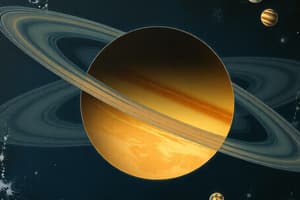Podcast
Questions and Answers
What is Kepler's First Law?
What is Kepler's First Law?
Planets travel in elliptical orbits with the sun at one focus.
What is Kepler's Second Law?
What is Kepler's Second Law?
A line from the planet to the sun sweeps out equal areas in equal times.
What is Kepler's Third Law?
What is Kepler's Third Law?
The period of a planet's orbit is proportional to its distance from the sun.
What is an implication of Kepler's First Law?
What is an implication of Kepler's First Law?
What is an implication of Kepler's Second Law?
What is an implication of Kepler's Second Law?
What is an implication of Kepler's Third Law?
What is an implication of Kepler's Third Law?
Flashcards are hidden until you start studying
Study Notes
Kepler's Three Laws of Planetary Motion
- Kepler's First Law: Planets move in elliptical orbits with the Sun located at one focus of the ellipse, highlighting the non-circular nature of planetary orbits.
- The elliptical shape results in varying distances between planets and the Sun throughout their orbits, affecting gravitational interactions.
Kepler's Second Law
- This law states that a line drawn from a planet to the Sun sweeps out equal areas in equal times, indicating that planets travel faster when they are nearer to the Sun and slower when farther away.
- The unequal speeds result from the conservation of angular momentum, meaning that planets accelerate as they approach the Sun and decelerate as they move away.
Kepler's Third Law
- The period of a planet's orbit is proportional to its average distance from the Sun, expressed mathematically as ( T^2 \propto r^3 ), where ( T ) is the orbital period and ( r ) is the average distance from the Sun.
- This means that planets that are closer to the Sun not only complete their orbits more quickly, with shorter orbital periods, but also reflect a predictable relationship between distance and orbital time.
Studying That Suits You
Use AI to generate personalized quizzes and flashcards to suit your learning preferences.




